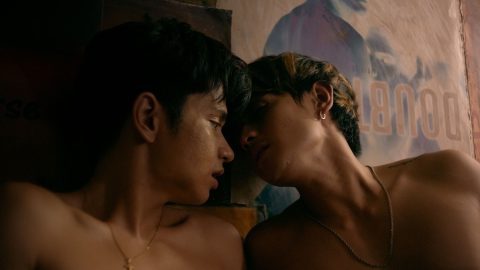Chosen family: the recurring darling of queer cinema. The premise is simple enough: LGBTQI+ folks from all walks of life can shed their familial traumas and find belonging among like-minded souls, provided they’re willing to look. A big handful of queer films this year trots out the trope yet again, painting an oh-so-sanitized picture of utopian camaraderie. The message? If every small-town queer just escapes to the big city, dons a sparkly costume, and dives into the scene, they’ll instantly be welcomed into a universal queer family.
Petersen Vargas’ Competition Entry Some Nights I Feel Like Walking (2024) doesn’t really buy into this glittery utopia trope, and instead tackles the grittier realities of queer life, where survival often means turning to sex work and petty crime. Less Layla (Amrou Al-Kadhi, 2024) and more Paris is Burning (Jennie Livingston, 1990) or Pier Kids (Elegance Bratton, 2019) spun into fiction.
Uneven in terms of plotting and tone, but still undeniably compelling, the film tracks a group of young hustlers orbiting a Manila bus terminal, focusing on a friendship between seasoned hustler Uno (Jomari Angeles) and newcomer Zion (Miguel Odron), who harbours a scandalous secret. When one of their own crew dies of an overdose at the hands of a john, the group bands together for a different kind of chosen family mission: honouring their friend’s final wish to return his body to his rural village for burial. It’s a raw, scrappy tale that trades in neon dreams for harsh truths — and it’s all the better for it.
Even though Some Nights is dead-ass serious, it veers into the absurd at times — they’re literally trying to sneak their dead friend’s corpse around without getting caught for a good portion of the first hour. The mix of that plotline with Vargas’ grim dive into the gay rough-trade sex work scene, centred around seedy transport hubs, feels like a chaotic mashup of the fabulously stupid comedy Weekend at Bernie’s (Ted Kotcheff, 1989) and the unhinged sexual desperation of The Wounded Man (Patrice Chéreau, 1983) or Forty Deuce (Paul Morrissey, 1982) — the latter also featuring — yep — a plot revolving around a dead hustler’s body.
A change in film language as the action moves from urban to rural environment pushes the plot, rooted in real-life tension and action, into an almost dreamlike atmosphere, with endless winding roads, painful memories drenched in purple smoke, and other unexpected developments. Despite being disorienting and even confusing at times in terms of plotting and intent, the film glides along toward a pleasing denoument that speaks to these characters messy needs and wants but also taps into something more universal: sometimes you need to get back home, even if it’s not home anymore.

Editor-at-large Jared loves movies and lives with Kiki in Berlin.
